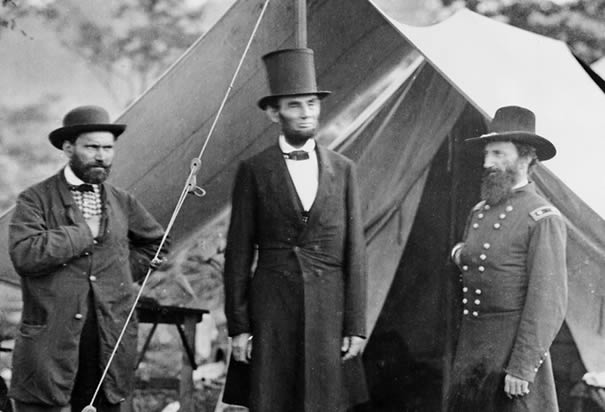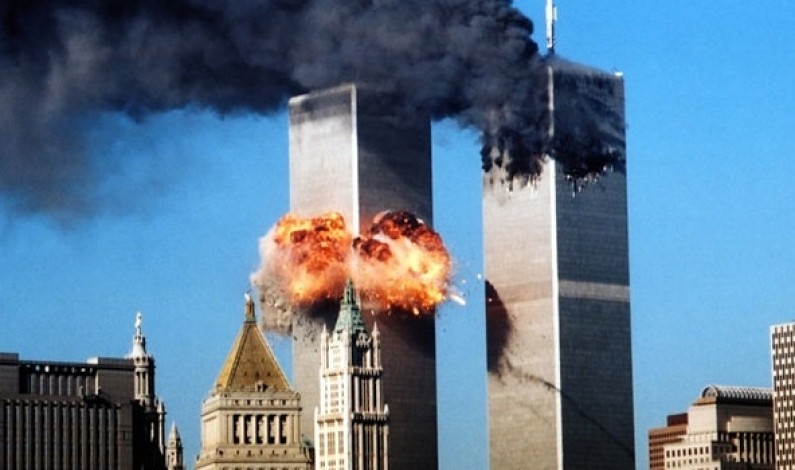Presidente Trump issuing his first Executive Order
January 2017
The act of using Executive Orders has been around since the time of "Honest" Abraham Lincoln. The legal basis of such decisions (without the consent of any of the other branches of Government) is based on the idea that in times of crisis (wars, invasions, attacks, etc, etc..), Emergency War Powers may need to be assumed and compiled into giving the office of the President of the United States of America, for the most part, dictatorial powers. In times of real crisis, it was realized that it was not a good idea to have a lot of discussion or debate on what actions needed to be taken especially from Lincoln's point of view as he was dealing with insurrection from the Southern states at the time and unavoidable gridlock in both houses of Congress.
Lincoln’s first Executive Order seemed to be an alright decision on his part. With seven States walking out of Congress, and thus eliminating the possibility of the quorum needed for the Congress to act, the only choice seemed to be to declare a State of Emergency and issue whatever Orders were necessary. In times of Civil War, there really wouldn't be any problem with this obviously as the country was ripping itself to shreds.
The only problem is that the United States has never ended the State of Emergency, and thus still allows Executive Orders as an absolute legal prerogative of the President. Thus, President Trump technically has dictatorial powers...that should be something to think about. That is to not say that the President has absolute power. Executive Orders might seem to be the case of absolute power, but if any President decides to truly flex his or her muscles, there is a distinct possibility that he (or she) could blow up the whole con and would not be obeyed by critical elements within the federal and/or State apparatuses (i.e. military). There could even be counter actions from, of all people, the people themselves.. However, the latter would probably occur.
 |
| Abraham Lincoln with his military advisers at Sharpsburg Lincoln's original State of Emergency declaration has never been rescinded |
On one hand, Executive Orders eliminate Constitutional rights. In a State of Emergency, standard processes such as due process, rights to Trial By Jury, Common Law, Justice, equal protection under the law, and so on, are simply not attainable. They may be allowed in SOME cases, if only for appearances’ sake. But it is purely the discretion of the government (i.e. President) to what rights are allowed. The inalienable rights of the Constitution are temporarily suspended. Enemy Combatants can identified on a whim. (Remember the Trading with the Enemy Act and the Amendatory Act?)
Any declared State of Emergency is supposedly limited to three years, and thereafter ends. However, the United States has been in a State of Emergency for about a hundred and forty some odd years. All that has been necessary in the past is for each succeeding President to declare a State of Emergency (which probably doesn't get press..which interestingly enough, under a State of Emergency, the press may be controlled and censored by the hands of the Government). Justification for the continuing States of Emergency range from the two US Bankruptcies of 1861 and 1933 to the recently declared War on Terrorism in the aftermath of 9-11-2001.
The difficulty in ending a State of Emergency is that there has been so much law that has come into being under it. Everything from the Internal Revenue Service to the Federal court system would be invalidated upon the restoration of order. Going back to the original Constitutional foundation would cause grave and irreparable damage to corporate politics, corporate rule, capitalism, and the humongous bureaucracy of the US Government. Worse yet, it would be calamitous to the power/war mongers, the International Financiers,etc.
 |
| President Clinton signing an Executive Order establishing the National Science and Technology Council |
On June 3, 1994, President Clinton signed Executive Order #12919. (The number of Executive Orders should make you think, executive orders are sequential meaning that up to Clinton, there were already about 13,000 executive proclamations handed down by his Presidential predecessors) Clinton’s latest scandal, his EO #12919, gathered together into a single document all the power and authority of a multitude of Executive Orders issued by preceding presidents from John Kennedy until 1994 as forementioned.
The result of this Executive Order in consolidating previous presidential orders was to deliver unprecedented authority into the hands of the Chief Executive -- powers that far exceed those powers granted him under the United States Constitution. Within President Clinton’s EO 12919 are powers originally claimed by President Kennedy in a series of Executive Orders signed into “law” in February of 1962, which, if invoked would virtually suspend the greater portion of liberties guaranteed by the United States Constitution.
Section three of Kennedy's EO #10995 is entitled “ASSIGNING TELECOMMUNICATIONS MANAGEMENT FUNCTIONS” and states a wierd element:
“Such authority shall include the power to amend modify, or revoke frequency assignments.”
Subtle as this sounds, it embodies the power of the Chief Executive Officer in time of “national emergency” to seize control of all radio and other telecommunications.
In addition to President Kennedy’s E.O. 10995, four other of his Orders were included by Clinton in his E.O. which contain provisions to disable constitutional rights. Executive Order 10997, for example, empowers the Secretary of the Interior (Ken Salazar) to seize all energy production facilities -- specifically, “electrical power”, “petroleum”, “gas”, “solid fuels”, and “minerals”. Section 3, subsection (d) of that order, entitled “Claimancy” states:
“Prepare plans to claim materials, manpower, equipment, supplies and services needed in support of assigned responsibilities and other essential functions of the Department... to insure availability of such resources in an emergency.”
The word claim, in reference to “materials, manpower, equipment, supplies and services”, is noteworthy. “Claim”, as defined by Black's Law Dictionary, is, “To demand as one’s own or as one’s right... means by or through which claimant obtains possession or enjoyment of a privilege or something. Demand for monies or property as of a right...” In other words, the government MIGHT, upon declaration of a state of local or national emergency (or simply admitting to the currently installed State of Emergency) seize any of the above, private or otherwise, including “manpower”.
As to what constitutes a national emergency, let's see what Black's Law has to say...“A state of national crisis; a situation demanding immediate and extraordinary national or federal action. Congress has made little or no distinction between a ‘state of national emergency’ and a ‘state of war.’” [Black's Law Dictionary]
Therefore, in a State of national emergency (e.g. a “War on Terrorism”), the government has the authority under Executive Orders to:
1) Place all food resources under the Secretary of Agriculture (E.O. 10998),
2) Place control over all means of transportation, public and private, under the Secretary of Commerce (E.O. 10999), and
3) Establish under the Secretary of Labor’s (Alex Acosta) discretion, all manpower resources, with the authority to “claim” services (labor) and involuntarily relocate workers (E.O. 11000). Collateral authority for this conscription of labor is given in Title 50 app.
U.S.C, Section 2153 “WAR AND NATIONAL DEFENSE” under the section addressing civilian disposition entitled, “DEFENSE PRODUCTION ACT OF 1950” in which is set forth that civilian personnel may be assigned work without regard to payment or reimbursement.
The list goes on and on and on..... Matter of fact, executive orders were crafted and signed in stealing Cherokee Indian lands and WWII Japanese interment camps.
The creation of a Federal Emergency Management Agency (FEMA) via Executive Order 12148 has created a monster which sees its role as a “new frontier in the protection of individual and governmental leaders from assassination, and of civil and military installations from sabotage and/or attack, as well as prevention of dissident groups from gaining access to U.S. opinion, or a global audience in times of crisis." (actual mission statement). FEMA is in all actuality the Praetorian Guard to the President, who might as well be a dictator like Caesar!
Without any Congressional approval, the President now has the power to transfer millions of citizens to any part of the country (Rex 84), the power to suspend the Press and to force national registration of all persons. The President, in essence, has dictatorial powers never provided to him under the Constitution. The President has the power to suspend the Constitution and the Bill of Rights in a real or perceived emergency (think about this one). Unlike Lincoln and Roosevelt, these powers are not derived from a wartime need, but from any crisis, domestic or foreign, hostile or economic. Roosevelt created extraordinary measures during the Great Depression, but any President faced with a similar, or lesser, economic crisis now has extraordinary powers to assume dictatorial status.” (Will Trump invoke these powers to stem off an upcoming crisis, economical or otherwise?)
President Bush himself upped the ante on Executives Orders during his eight year reign. Let's look at Executive Order number 13223 of September 14, 2001 entitled “Ordering the Ready Reserve of the Armed Forces To Active Duty and Delegating Certain Authorities to the Secretary of Defense and the Secretary of Transportation.” In text, the Secretary of Transportation (Elaine Chao) and SecDef now have the authority “without the approval, ratification, or other action by the President"... “to recall any regular officer or enlisted member on the retired list to active duty and to detain any enlisted member beyond the term of his or her enlistment.”
The United States of America has legally been under a state of national emergency since 1933 (technically, since 1861). The legislation necessitating it has never been repealed, thus leaving the president with instant powers to suspend the Constitution and Bill of Rights. Most legal scholars and legislators who have studied the matter concur that subsequent Presidents have already suspended the Constitution since the moment the first legislation was signed into law by President Franklin Roosevelt. The actual suspension of those constitutional rights await only the impetus of a national emergency requiring it. What could cause that? Another terrorist attack on the mainland, economic collapse, etc?


0 comments:
Post a Comment